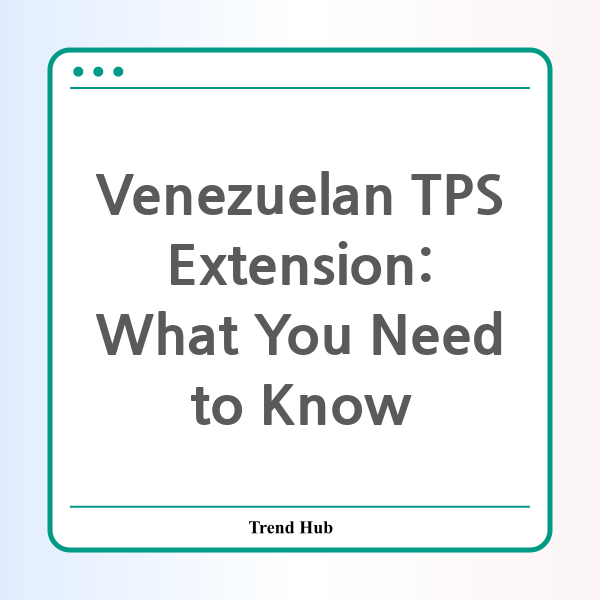* This website participates in the Amazon Affiliate Program and earns from qualifying purchases.

As the landscape of immigration policy continues to shift, the recent extension of Temporary Protected Status (TPS) for Venezuelan nationals has sparked considerable discussion. This extension, which could affect around 600,000 Venezuelan immigrants currently in the U.S., comes at a crucial time just ahead of a new political administration that is expected to take a tougher stance on immigration.
But what exactly does this TPS extension mean for Venezuelans living in the United States, and how does it fit within the broader context of immigration policy?
Understanding Temporary Protected Status (TPS)
Temporary Protected Status (TPS) is a temporary immigration status granted to eligible nationals of designated countries experiencing ongoing armed conflict, environmental disasters, or other extraordinary conditions. Under TPS, individuals are protected from deportation and can obtain work permits while their status is active.
The current extension for Venezuelans means that those who have been living in the U.S. under TPS will have their protections extended for an additional 18 months, pushing the expiration of their status to October 2026. This is significant, as it offers continued security to many families and individuals facing uncertain futures in their home country.
The Reasons Behind the Extension
The Department of Homeland Security (DHS) cited several reasons for the extension, primarily focusing on the ongoing political and economic crises in Venezuela. The humanitarian situation remains dire, with widespread shortages of essential goods, political instability, and a history of human rights abuses. These conditions create a considerable risk if individuals were to be returned to Venezuela, justifying the TPS extension.
Moreover, the extension reflects broader patterns within U.S. immigration policy, where the Biden administration has aimed to expand protections for those fleeing unsafe conditions—contrasting starkly with policies from previous administrations that sought to limit immigration pathways.
Implications for Immigration Policy
The extension of TPS for Venezuelans not only affects those directly involved but also sets a significant precedent for how immigration policy may evolve under future leadership. If the incoming administration follows through on its promises to ramp up deportation efforts, this extension could complicate those plans, particularly as Venezuelans have been identified as a focus due to the rise of gang activity associated with the Tren de Aragua gang.
This situation raises critical questions about the future of TPS itself. As of now, there are 17 countries designated for TPS, with ongoing debates on whether these designations will continue or be revoked. The potential for legislative changes under a new administration adds another layer of uncertainty for those relying on these protections.
Conclusion: The Road Ahead for Venezuelan Nationals
For Venezuelan nationals living in the U.S. under TPS, the recent extension is a reprieve, offering continued protection and work authorization until at least 2026. However, as political dynamics shift, the community must remain vigilant about potential changes to immigration policies that could affect their status.
As advocates call for more comprehensive immigration reforms, the conversation around TPS highlights the ongoing challenges faced by immigrants and the vital need for policies that reflect humanitarian needs. As we look towards the future, it will be essential to monitor how these developments unfold and what they mean for individuals seeking safety and stability in the United States.
* This website participates in the Amazon Affiliate Program and earns from qualifying purchases.